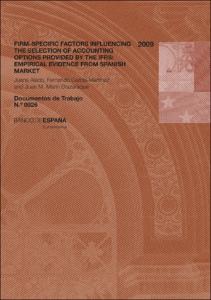Registro completo de metadatos
| Campo DC | Valor |
|---|---|
| dc.contributor.author | Aledo, Juana |
| dc.contributor.author | García Martínez, Fernando |
| dc.contributor.author | Marín Diazaraque, Juan M. |
| dc.coverage.spatial | España |
| dc.date.accessioned | 2019-08-10T17:55:26Z |
| dc.date.available | 2019-08-10T17:55:26Z |
| dc.date.issued | 2009-12-10 |
| dc.identifier.issn | ISSN: 0213-2710 (en papel) |
| dc.identifier.issn | ISSN: 1579-8666 (en línea) |
| dc.identifier.uri | https://repositorio.bde.es/handle/123456789/7005 |
| dc.description.abstract | It is generally accepted that International Financial Reporting Standards (IFRS) promote a "true and fair" presentation of financial statements. The improvement of the quality of financial reporting helps investors, bankers and regulators make better decisions. Spanish GAAP, on the other hand, are based on a "prudent" approach for asset and liability recognition and valuation, with the goal of protecting stakeholders. Adjustments introduced as a consequence of IFRS adoption may result in (i) the recognition (or derecognition) of assets and liabilities for the first time (i.e. derivative financial assets and liabilities) and (ii) the application of accounting criteria that differs from those recognised under local GAAP (i.e. cost vs. revaluation model). The main objective of this study is to examine the financial statements of the firms listed on the Spanish Continuous Stock Market that have been using IFRS since 2005 to determine the accounting policy options they apply under IFRS and, most importantly, to provide evidence of the factors driving these choices. Since there are significant differences in reporting quality between countries as a consequence of different accounting regimes and institutional frameworks, mandatory IFRS adoption provides an opportunity to assess the economic consequences of these differences. The main finding of this paper is that companies apply the most conservative criteria to reduce the number of discrepancies between the two standards, particularly in regards to presentation and measurement practices. Nevertheless, the evitación from Spanish GAAP has a significant impact on reported equity and net income |
| dc.format.extent | 39 p. : gráf. |
| dc.language.iso | en |
| dc.publisher | Banco de España |
| dc.relation.ispartof | Documentos de Trabajo / Banco de España, 0926 |
| dc.rights | Reconocimiento-NoComercial-CompartirIgual 4.0 Internacional (CC BY-NC-SA 4.0) |
| dc.rights | In Copyright - Non Commercial Use Permitted |
| dc.rights.uri | https://creativecommons.org/licenses/by-nc-sa/4.0/deed.es_ES |
| dc.rights.uri | http://rightsstatements.org/vocab/InC-NC/1.0/ |
| dc.subject | International Financial Reporting Standards |
| dc.subject | Mandatory disclosure level |
| dc.subject | Fair-value accounting |
| dc.title | Firm-especific factors influencing the selection of accounting options provided by the IFRS : empirical evidence from spanish market |
| dc.type | Documento de trabajo |
| dc.identifier.bdebib | 000275080 |
| dc.identifier.bdepub | DTRA-200926-eng |
| dc.subject.bde | Normativa contable |
| dc.publisher.bde | Madrid : Banco de España, 2009 |
| dc.subject.jel | M41 |
| dc.subject.jel | M48 |












